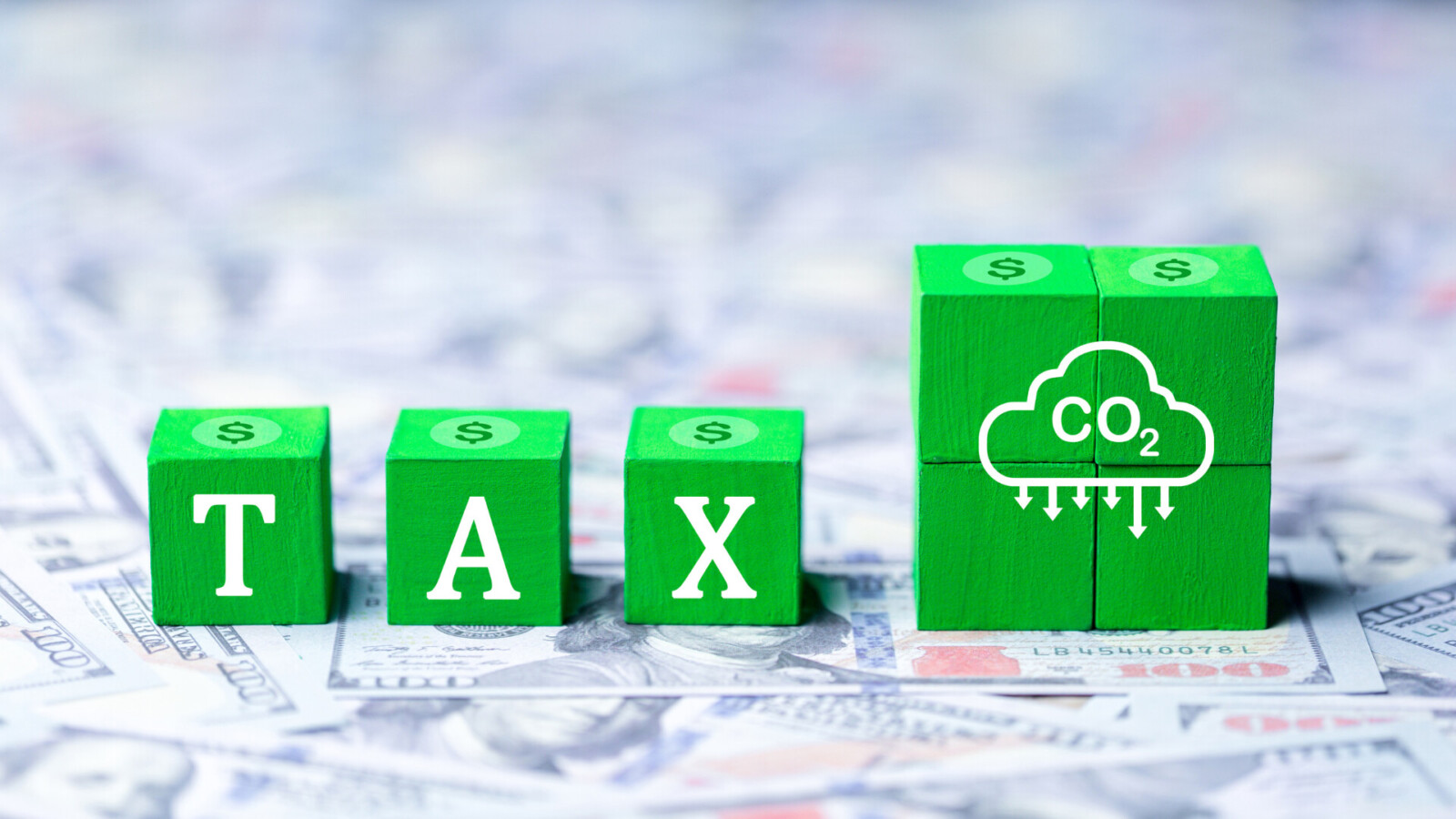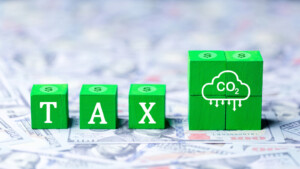The Carbon Tax: Challenges and Prospects for the Energy Transition
The carbon tax, often perceived as a key tool for the energy transition, sparks intense debates regarding its economic, social, and environmental impact.
What is the carbon tax and how does it work?
The carbon tax, also known as the European Emissions Trading System (ETS) , is a mechanism implemented to reduce carbon dioxide (CO₂) emissions. This tax is based on the “polluter pays” principle: companies must purchase emission allowances corresponding to the amount of CO₂ they emit. Subsequently, these allowances are traded on a market where their number decreases annually to achieve the carbon neutrality objectives set by the European Union.
In 2027, through ETS 2, this system will be extended to the building and transport sectors. This means that fossil fuel suppliers, such as gas and heating oil providers, will also have to purchase allowances to cover emissions generated by these sectors. The price of these allowances and their impact on consumers will be crucial for the progressive reduction of CO₂ emissions.
What is the impact on household heating bills?
The impact of ETS 2 on household bills will be highly significant. With the increase in CO₂ prices, gas and heating oil suppliers will have to adjust their prices, leading to a rise in energy bills. According to a study (ULiège), an average price of €100 per tonne of CO₂ could increase the gas heating bill by approximately €420 per year for an average consumer in Belgium, representing about 24% of the annual energy bill. This increase might be moderate in the short term, but in the long term, the impact on the most vulnerable households risks being much heavier, especially since accompanying measures, such as the Social Climate Fund, have not yet proven their effectiveness. (Impacts of introducing a carbon tax: the importance of market size )
Profitability Put to the Test for Businesses
Axylia’s study on the impact of the carbon tax on large Belgian companies reveals that less than half of the Bel 20 companies would be profitable if they had to bear the cost of their CO₂ emissions at €127 per tonne. (Impacts of introducing a carbon tax: the importance of market size) For example, AB InBev, with an EBITDA (earnings before interest, taxes, depreciation, and amortization) of nearly €19 billion, could easily absorb a carbon bill of €3.3 billion. However, for companies like Solvay, whose carbon bill would exceed €4.2 billion, this could deal a fatal blow to their profitability (A carbon tax would leave less than half of Bel 20 companies profitable).
This situation could lead to higher production costs and a risk of delocalization, particularly in sectors such as steelmaking or cement, where decarbonization costs are especially high. The industrial sector, which accounts for a significant portion of CO₂ emissions in Belgium, will need to invest massively to remain competitive while reducing its carbon footprint. Belgian industry should thus invest at least an additional €25 billion by 2050 to achieve carbon neutrality objectives (Decarbonization: Belgian industry will need to invest at least an additional €25 billion by 2050).
Political and Social Repercussions: Bridging a Divide
The carbon tax is a subject that deeply divides the Belgian political class. Left-wing parties, such as the PS and Ecolo, support its introduction while insisting on the need for social measures to protect vulnerable households. Right-wing parties, such as the MR and Open VLD, advocate for gradual implementation and
The debate on the carbon tax in Belgium reflects the tensions between climate objectives and social concerns. Trade unions, such as the FGTB (General Federation of Labour of Belgium), have expressed concerns about the impact of this tax on the most modest households. According to Jean-François Tamellini, general secretary of the Walloon FGTB, “the most disadvantaged risk being the only ones to suffer the effects of the carbon tax” if they do not have credible alternatives to reduce their energy consumption (Serret, 2024).
The Crucial Role of Compensatory Measures and Redistribution
The true challenge of the carbon tax lies in its ability to generate a just transition. To mitigate the negative effects on households, the revenues generated by ETS 2 must be used to finance the energy transition and social measures. In Europe, mechanisms such as the Social Climate Fund are intended to redistribute revenues to help people in more precarious situations, by providing them with investment aid for more ecological equipment or to finance insulation work (Denoël, 2024). The success of this redistribution depends on how national governments develop these measures. The lack of clarity on fund allocation and the absence of concrete measures to ensure support for the most vulnerable households remain major points of contention. It is therefore essential to provide rigorous and equitable management, without which the carbon tax could have dramatic social consequences, increasing inequalities and hindering public acceptance.
Conclusion: An Essential but Complex Solution
The carbon tax is an essential lever for achieving European climate objectives, but it must be accompanied by clear and effective redistribution measures to ensure a just transition. If it is poorly designed or too sudden, it could exacerbate social inequalities and undermine business competitiveness. However, if revenues are properly reinvested in the energy and social transition, the carbon tax could play a key role in decarbonizing the economy while protecting the most vulnerable citizens.
How Belgium, and Europe more broadly, manage this transformation will determine whether the carbon tax becomes a tool for progress or a factor of division, increasing inequalities. It is therefore imperative to find a balance between climate urgency and the protection of the most vulnerable, to ensure a just energy transition.
The Carbon Tax: Challenges and Prospects for the Energy Transition
The carbon tax, often perceived as a key tool for the energy transition, sparks intense debates regarding its economic, social, and environmental impact.
What is the carbon tax and how does it work?
The carbon tax, also known as the European Emissions Trading System (ETS), is a mechanism implemented to reduce carbon dioxide (CO₂) emissions. This tax is based on the “polluter pays” principle: companies must purchase emission allowances corresponding to the amount of CO₂ they emit. Subsequently, these allowances are traded on a market where their number decreases annually to achieve the carbon neutrality objectives set by the European Union.
In 2027, through ETS 2, this system will be extended to the building and transport sectors. This means that fossil fuel suppliers, such as gas and heating oil providers, will also have to purchase allowances to cover emissions generated by these sectors. The price of these allowances and their impact on consumers will be crucial for the progressive reduction of CO₂ emissions.
What is the impact on household heating bills?
The impact of ETS 2 on household bills will be highly significant. With the increase in CO₂ prices, gas and heating oil suppliers will have to adjust their prices, leading to a rise in energy bills. According to a study (ULiège), an average price of €100 per tonne of CO₂ could increase the gas heating bill by approximately €420 per year for an average consumer in Belgium, representing about 24% of the annual energy bill. This increase might be moderate in the short term, but in the long term, the impact on the most vulnerable households risks being much heavier, especially since accompanying measures, such as the Social Climate Fund, have not yet proven their effectiveness. (Ernst, 2022)
Profitability Put to the Test for Businesses
Axylia’s study on the impact of the carbon tax on large Belgian companies reveals that less than half of the Bel 20 companies would be profitable if they had to bear the cost of their CO₂ emissions at €127 per tonne. (Ernst, 2022) For example, AB InBev, with an EBITDA (earnings before interest, taxes, depreciation, and amortization) of nearly €19 billion, could easily absorb a carbon bill of €3.3 billion. However, for companies like Solvay, whose carbon bill would exceed €4.2 billion, this could deal a fatal blow to their profitability. (Paquay, 2024).
This situation could lead to higher production costs and a risk of delocalization, particularly in sectors such as steelmaking or cement, where decarbonization costs are especially high. The industrial sector, which accounts for a significant portion of CO₂ emissions in Belgium, will need to invest massively to remain competitive while reducing its carbon footprint. Belgian industry should thus invest at least an additional €25 billion by 2050 to achieve carbon neutrality objectives (Van De Weyer & Delrue, 2024).
Political and Social Repercussions: Bridging a Divide
The carbon tax is a subject that deeply divides the Belgian political class. Left-wing parties, such as the PS and Ecolo, support its introduction while insisting on the need for social measures to protect vulnerable households. Right-wing parties, such as the MR and Open VLD, advocate for gradual implementation and
consideration of social impacts. The PTB, for its part, categorically rejects this tax, ca
lling it “climate-elitist” and believing it only reinforces inequalities.
The debate on the carbon tax in Belgium reflects the tensions between climate objectives and social concerns. Trade unions, such as the FGTB (General Federation of Labour of Belgium), have expressed concerns about the impact of this tax on the most modest households. (Serret, 2024).
The Crucial Role of Compensatory Measures and Redistribution
The true challenge of the carbon tax lies in its ability to generate a just transition. To mitigate the negative effects on households, the revenues generated by ETS 2 must be used to finance the energy transition and social measures. In Europe, mechanisms such as the Social Climate Fund are intended to redistribute revenues to help people in more precarious situations, by providing them with investment aid for more ecological equipment or to finance insulation work (Denoël, 2024
). The success of this redistribution depends on how national governments develop these measures. The lack of clarity on fund allocation and the absence of concrete measures to ensure support for the most vulnerable households remain major points of contention. It is therefore essential to provide rigorous and equitable management, without which the carbon tax could have dramatic social consequences, increasing inequalities and hindering public acceptance.
Conclusion: An Essential but Complex Solution
Karno, a key player in the energy transition through the construction of decarbonized heat networks, acknowledges that the carbon tax is an essential lever for achieving European climate objectives and accelerating the transition to a low-carbon economy. However, it is crucial that it be implemented in an equitable and socially responsible manner.
If it is poorly designed or too sudden, it could exacerbate social inequalities and undermine business competitiveness. However, if revenues are properly reinvested in the energy and social transition, the carbon tax could play a key role in decarbonizing the economy while protecting the most vulnerable citizens.
How Belgium, and Europe more broadly, manage this transformation will determine whether the carbon tax becomes a tool for progress or a factor of division, increasing inequalities. It is therefore imperative to find a balance between climate urgency and the protection of the most vulnerable, to ensure a just energy transition.
Sources:
- Denoël, T. (2024, June 6). The carbon tax, a taboo electoral subject. Le Vif.
- Ernst, L. (2022). Impacts of introducing a carbon tax: the importance of market size [Master’s thesis, HEC-Management School of the University of Liège]. MatheO.
- Ernst, L. (2021-2022). Impacts of introducing a carbon tax: the importance of market size. Master in Management Sciences (Part-time), HEC-Management School of the University of Liège, Liège.
- Paquay, M. (2024, March 23). A carbon tax would leave less than half of Bel 20 companies profitable. L’Echo.
- Serret, P. (2024, March 26). CLIMATE – Will the least wealthy be the only ones to bear the “carbon tax” effect? L’Avenir.
- Van De Weyer, M., & Delrue, M. (2024, June 15). Decarbonization: Belgian industry will need to invest at least an additional €25 billion by 2050. L’Echo.

